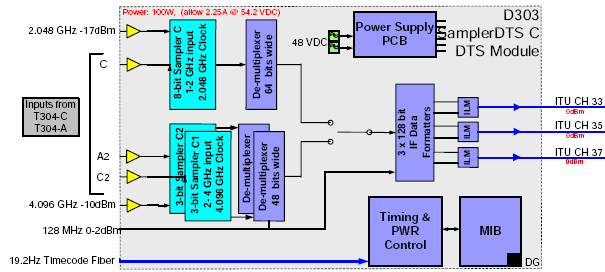| Overview | Package | Class | Use | Tree | Deprecated | Index | Help |

|

|
|||||||||
| PREV CLASS NEXT CLASS | FRAMES NO FRAMES | |||||||||
| SUMMARY: NESTED | FIELD | CONSTR | METHOD | DETAIL: FIELD | CONSTR | METHOD | |||||||||
java.lang.Objectedu.nrao.sss.model.resource.evla.D301
public class D301
The EVLA D301 Sampler / DTS.
This device holds a single eight-bit sampler and a pair of three-bit samplers. The output of this device is derived from either the 8-bit or the two 3-bit input streams.
As used by the EVLA electronics, the
inputs are feed by a pair of T304 downconverters. In 8-bit mode,
a single T304 is connected to one of the four D301s. In 3-bit mode,
a single D301 is connected to a pair of T304s, either an A/C or B/D
(RCP/LCP) pair.

Version Info:
| $Revision: 1241 $ |
| $Date: 2008-04-25 14:37:37 -0600 (Fri, 25 Apr 2008) $ |
| $Author: dharland $ (last person to modify) |
| Constructor Summary | |
|---|---|
D301(String deviceName)
Creates a new D301 with the given name. |
|
| Method Summary | |
|---|---|
void |
eraseSignalMemory()
Erases this device's memory of its most recent execution. |
void |
execute()
Runs the internal samplers for which this digitizer has been configured. |
void |
executeFromStartOfChainUpTo(SignalProcessor firstUnexecutedDevice)
See SignalProcessor.executeFromStartOfChainUpTo(SignalProcessor). |
void |
executeUpTo(SignalProcessor firstUnexecutedDevice)
See SignalProcessor.executeUpTo(SignalProcessor). |
SortedSet<Integer> |
getAllowableBitsPerSample()
|
int |
getBitsPerSample()
|
SignalPipe |
getEightBitInputPipe()
Returns the input pipe that feeds the internal 8-bit sampler. |
String |
getName()
Returns the name of this device. |
Collection<DigitalSignal> |
getSignals()
Returns the signals produced by this digitizer. |
List<SignalPipe> |
getThreeBitInputPipes()
Returns the input pipes that feed the internal 3-bit samplers. |
void |
setBitsPerSample(int numberOfBits)
Configures this digitizer so that it produces output with the given number of bits per sample. |
| Methods inherited from class java.lang.Object |
|---|
clone, equals, finalize, getClass, hashCode, notify, notifyAll, toString, wait, wait, wait |
| Constructor Detail |
|---|
public D301(String deviceName)
deviceName - an optional name for this device. If this value is null
a default name will be used in its place.| Method Detail |
|---|
public String getName()
getName in interface Digitizerpublic SignalPipe getEightBitInputPipe()
myDigitizer.getEightBitInputPipe().connectInputTo(mySource);
public List<SignalPipe> getThreeBitInputPipes()
myDigitizer.getThreeBitInputPipes().get(0).connectInputTo(mySource);
public int getBitsPerSample()
getBitsPerSample in interface Digitizerpublic void setBitsPerSample(int numberOfBits)
The only legal values for this digitizer are 3 and 8. Other values will be converted to the nearest legal value.
setBitsPerSample in interface DigitizernumberOfBits - the type of output, expressed as bits per sample, that this
digitizer should produce.public SortedSet<Integer> getAllowableBitsPerSample()
getAllowableBitsPerSample in interface Digitizerpublic Collection<DigitalSignal> getSignals()
In 8-bit mode, the returned collection will hold a single signal. In 3-bit mode, the returned collection will hold two signals.
public void eraseSignalMemory()
getSignals()public void execute()
configured. The results of the execution
are available via the getSignals() method.
execute in interface SignalProcessorpublic void executeUpTo(SignalProcessor firstUnexecutedDevice)
SignalProcessor.executeUpTo(SignalProcessor).
executeUpTo in interface SignalProcessorpublic void executeFromStartOfChainUpTo(SignalProcessor firstUnexecutedDevice)
SignalProcessor.executeFromStartOfChainUpTo(SignalProcessor).
executeFromStartOfChainUpTo in interface SignalProcessor
|
|
|||||||||
| PREV CLASS NEXT CLASS | FRAMES NO FRAMES | |||||||||
| SUMMARY: NESTED | FIELD | CONSTR | METHOD | DETAIL: FIELD | CONSTR | METHOD | |||||||||